#modern Austen
Text
credit: SparkNotes/Elodie
https: // www. sparknotes.com/blog/pride-and-prejudice-as-told-in-a-series-of-texts/
Darcy ➡️ Elizabeth

Bingley ➡️ Darcy
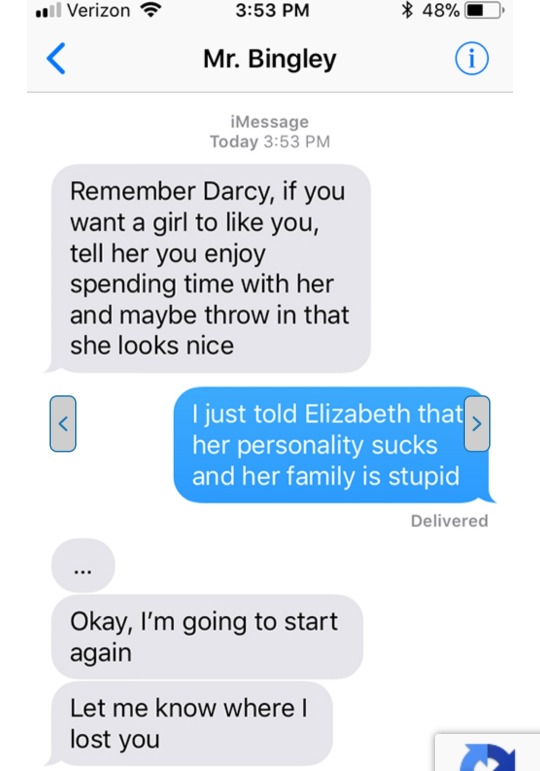
Elizabeth ➡️ Mr Bennet

Charlotte ➡️ Elizabeth
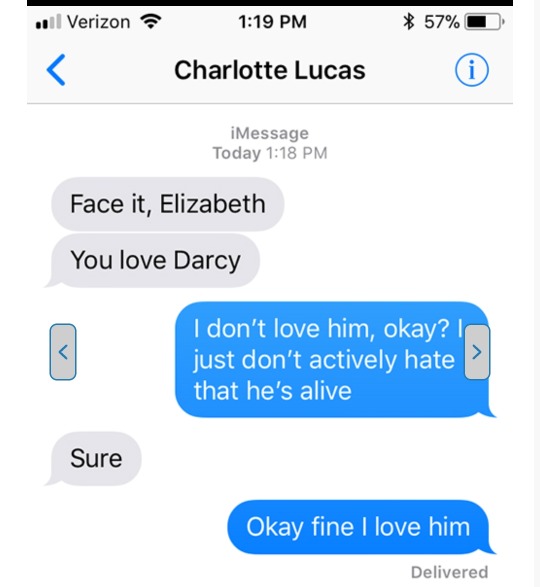
#p&p#pride and prejudice#jane austen#mr darcy#fitzwilliam darcy#prideandprejudice#mr. darcy#elizabeth bennet#janeite#prideandprejudice2005#pride and prejudice movie#pride and prejudice texto#pride and prejudice meme#pride and prejudice joke#pride and prejudice modern adaptation#austen character#charolotte lucas#mr bingley#pride and prejudice crack#pride and prejudice 1995
86 notes
·
View notes
Text
Like a lot of Austen fans, I love that she kept an eye out for faceclaims paintings in art showings she attended that matched her images of Elizabeth and Jane Bennet. Very relatable, lol.
But even more, I love that she came up with a mental justification for finding a painting that matched her image of Jane (probably this) but not Elizabeth. Her conclusion was that Darcy wouldn't like putting a painting of Elizabeth on display in such a way out of his mixed feelings of love, pride, and delicacy.
And well, yeah, it honestly does seem very in-character that Darcy would be viscerally uncomfortable with displaying a painting/paintings of Elizabeth in that kind of context. Elizabeth herself is pretty intensely private and sensitive, too, so I imagine she'd actually prefer to keep her paintings at home as well (she's frank and outgoing, but she keeps a lot to herself).
#meanwhile bingley and jane are like ... whatever. lol.#all this is one hundred percent canon to me tbh#but also i'm really entertained by the idea of modern elizabeth and darcy in this context#they disagree on many things but not their mutual loathing of instagram and tiktok :P#anghraine babbles#austen blogging#deep blogging#lady anne blogging#otp of otps#elizabeth bennet#fitzwilliam darcy
170 notes
·
View notes
Text
Mr. Darcy in a nutshell:
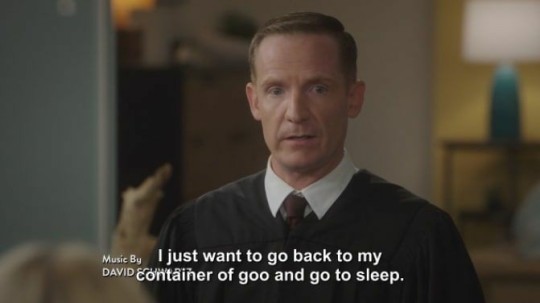
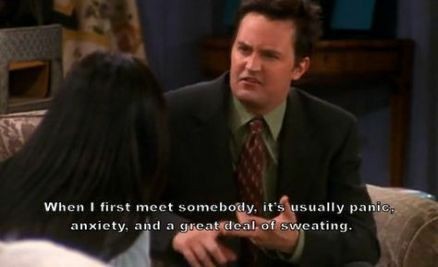

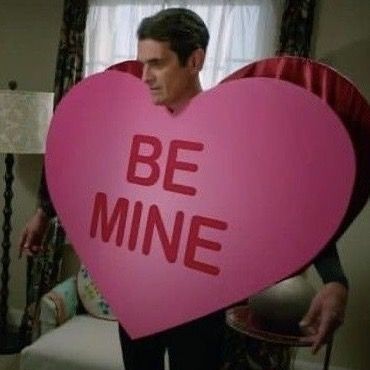
#nymphpens#dark academia#poets on tumblr#dead poets society#relatable#tumblr text post#classic literature#jane austen#pride and prejudice#the good place#friends#arrested development#modern family#mr darcy#in a nutshell#classic literature memes#literature memes#Elizabeth bennet#memes
156 notes
·
View notes
Text
I guess what pisses me off the most about the new Persuasion adaptation -- and I say this as someone who doesn't really consider herself a passionate Austen fan (but apparently making a bad adaptation of Persuasion is what turns me into one) -- is that if you want a Modern Austen, then my dude, make a Modern Austen. There are so many modern adaptations of Austen! Some of them are drek, some of them are decent, and some of them are exceptional, but they are all intentionally Modern Austen because that's what a modern adaptation is. For fuck's sake.
Don't go around making a period adaptation of a period novel and then spend your entire press tour complaining that the novel is just "too period" and "needs to be updated or no one would watch it" because a) you are demonstrably wrong; b) you look like an ass; and c) MODERN ADAPTATIONS ARE A THING THAT EXIST.
What the fuck.
2K notes
·
View notes
Text

i’ve been enjoying using goodreads again
#the means of us sharing the joy of a book club may be very modern (twitch) but the conversations themselves feel practically historical#(it’s sasha sienna’s jane austen book club it’s wonderful)#bookblr#jane austen#mansfield park#goodreads
100 notes
·
View notes
Text
I finally had inspiration to write again! I watched a drama recently where the main male character was a lawyer and it made me think of how many days you'd need off a year as a Romance Main Character, you know with all the kidnapping and dramatic injuries... what if you could harness the insanity of romance plots to your benefit?
Also, I understand why so many characters are lawyers (dramatic courtroom scenes, pays well, implies intelligence, sexy suits), but it's still funny to me how often you see lawyers in romance.
79 notes
·
View notes
Text
Elizabeth: my boyfriend is wearing a fucking suit to his autism diagnosis appointment
Darcy: it’s a special event!
Elizabeth: shut up
#if they existed in the modern world Darcy would be diagnosed with autism I’m just saying#I can’t be convinced otherwise of this. bro had so many symptoms#pride and prejudice#elizabeth bennet#fitzwilliam darcy#mr darcy#jane austen#incorrect quote#incorrect quotes
129 notes
·
View notes
Text
I'm reading Pride and Protest by Nikki Payne, a modern retelling of Pride and Prejudice and I'm struggling.
I actually find what Payne has done with the characters and setting really interesting and there are some touches I really like, especially turning Mary into Maurice - an "activist" who changes his activism regularly and lectures others on what they should be doing. (Any interpretation of Mary that isn't "misunderstood, shy, nerd girl who isn't-like-other-girls and is actually just like me, a misunderstood, shy, over-looked nerd girl" gets a positive vote from me.)
However, I really very much dislike her interpretation of Darcy (Dorsey) and Elizabeth (Liza)'s relationship and that is... kinda crucial!
It's waaaaaay over sexualised. Like, I get this is a romance book, but, like, I'm reading along enjoying the story and plot and then suddenly Dorsey is thinking about burying himself in Liza's breasts and I'm like "wooaah!" It's like it's impossible for the author to show them having feelings for each other without it being explicit and I find that out of place both with the source material and with the rest of the narrative.
Secondly, it is sexual... immediately. It commits the cardinal sin of saying "Darcy and Lizzy were hot for each other from the start and all the tension is ~ s e x u a l tension". The 2005 abomination does this too with the near kiss in the rain. And pretty much every single P&P inspired enemies-to-lovers narrative out there does it too. The problem is... this is a really, really inaccurate interpretation of the original book. Darcy is, admittedly, attracted to Elizabeth very quickly. Something that he manages to show not at all to anybody. Only Caroline Bingley, who is intensely interested in Darcy's romantic feelings, spots it. Later on, arch observer Charlotte and good friend Col Fitz also suspect something but by this point in Rosings Darcy has given into his feelings and is trying, albeit terribly, to court Elizabeth. Not that she notices. Darcy is completely able to conceal his sexual attraction to Elizabeth from everyone who isn't thinking about Darcy sexually. He is not quite so able to conceal his romantic interest later on. But crucially, at no point does Elizabeth notice a thing. She has LITERALLY NO IDEA. This is because Elizabeth has no concept of Darcy as a romantic prospect for her at all. She laughs at thinking what a good match he'd be for Anne de Bourgh, a probably sexless in appearance invalid. She doesn't hate him in a ~sexy~ way, she just really does not like him and does not consider him as a romantic option.
If Elizabeth is aware that Darcy has the hots for her, this changes the dynamic completely. If she is actually attracted to him in the first part of the story, that changes the dynamic completely. And both of these changes alter and potentially cheapen Elizabeth's character. If she is aware on some level that Darcy likes her and is interested in her, then she ends up looking like an idiot when the first proposal comes around. Or she ends up looking coy and like she is actually flirting with him. Yes, there is banter but Elizabeth is not consciously flirting or trying to attract him! Elizabeth spends the whole first part of the novel with a crush on Wickham. Austen is perfectly capable to showing to the audience without needing modern explicit language that a character has the hots for another character. Elizabeth fancies Wickham, not Darcy! As the meme goes, Darcy and Elizabeth are experiencing two very different kinds of tension! That's part of the comedy. And if Elizabeth is aware that she is attracted to Darcy, it just becomes a different story, and a less interesting one. Elizabeth becomes yet another romance novel heroine who likes the "bad boy" and tries to persuade herself not to, until the tension is sooooo strong and she ~snaps.
But one of the major points is that Elizabeth doesn't like bad boys! She falls for (well, crushes on) Wickham because she thinks he's good. She dislikes Darcy because she thinks he's bad. She only starts to consider Darcy positively when she understands and sees for herself the truth of his character. That is what she finds attractive, not him being a buttoned up jerk! "One has all the goodness, the other all the appearance of it." That is central to P&P's story and its message.
Unfortunately, in the aims of writing a "romance" novel, Pride and Protest gives us heaving busoms and erections and almost-kisses and therefore completely destroys my interest in Dorsey and Liza's relationship at the same time as well as finding it just a bit tasteless because it feels like there are two stories going on: an interesting exploration of how the context and characters of P&P would work in a highly politised and racially diverse modern USA - and a very generic romance novel story which doesn't do either Darcy and Elizabeth justice. A shame.
It does make me wonder about how to update Austen's novels in terms of sex. Because obviously one of the major changes between the 1810s and now is that having extra-marital sex is totally normal and people date and break up without social repercussions. So unless you are setting the update in a community where that is not the case, you've got to deal with sex being freely on offer. I guess there are different ways around it but I think if how you deal with sex means that the fundamental beats of the narrative and character development are changed, then something's gone wrong somehow. And I feel that Elizabeth's total obliviousness to Darcy having any positive feelings towards her at all until the moment he proposes to her is a crucial part of the plot and a source of unending humour.
#pride and prejudice#pride and protest#modern retelling#jane austen#fitzwilliam darcy#elizabeth bennet#darcy x elizabeth
93 notes
·
View notes
Text

#pride & prejudice#pride and prejudice#jane austen#mr darcy#fitzwilliam darcy#prideandprejudice#elizabeth bennet#mr. darcy#p&p#janeite#bridget jones#jane austen adaptations#austen adaptations#bride and prejudice#unleashing mr darcy#the lizzie bennet diaries#christmas at pemberley manor#colin firth#pride and prejudice movie#pride and prejudice modern adaptation#romantic movies#romance movies#romance films#telefilm#pride and prejudice poll#Aishwarya RaiA#pride and prejudice adaptation#jane austen confession
133 notes
·
View notes
Text
I'm usually irritated by the people sneering about fanfic insisting it is just intrinsically inferior to early modern writers raiding Ovid or Chaucer or the news or each other or whomever. I've never seen anyone have a decent rationale beyond early modern writing is intrinsically Art and fanfic is intrinsically Not Art, because of reasons (the artistic purity of working within early modern patronage and censorship, I guess?).
I'm not talking Shakespeare specifically (though Lear <3). He was by no means alone in borrowing characters and plots from previous sources and then doing his own thing with them. A lot of my favorite plays of the time re-purpose established stories in this way.
But also, it comes around to kind of funny when people are not only insisting that fanfic is definitionally Not Art and in some way totally different from the usual kind of borrowing that goes back millennia, but also that fanfic is somehow morally degenerate and harmful and unhinged in a new and shocking way.
Because if early modern English literature is defined by anything, it's being absolutely fucking unhinged.
I mean! The Revenger's Tragedy?? The White Devil (borrowed directly from the murder headlines)??? My best beloved 'Tis Pity She's a Whore (pretty obviously a spin on Romeo and Juliet But Now With Incest and Even More Murder)? These things are batshit. And fantastic! I love them! But holding them up on some pedestal of artistic and moral purity is just bizarre IMO.
There are differences between what they did and contemporary fanfic because we live in different eras and cultures, in some ways radically so, because copyright and intellectual property work so differently now and have affected storytelling so much, because of the effects of things like genre romance and the Internet and AO3, because patronage and censorship now work very differently in a lot of ways, because educations and literary norms are so different, and so on.
But is fanfic in some way uniquely trashy and shocking by contrast to what those men were thinking up? Nah.
#y'all act like a mildly edgy au is the herald of the literary end times and meanwhile several centuries ago#you've got playwrights going 'you know what would be fucked up? because i've got a GREAT idea'#i'm thinking of that quote about austen - 'you could not shock her more than she shocks me'#and i feel it's very accurate for a lot of early modern playwrights too#like you think fanfic would shock john ford? lmao#anghraine babbles#long post#fanfiction#early modern blogging#general fanwank
78 notes
·
View notes
Text
Elizabeth Bennett:
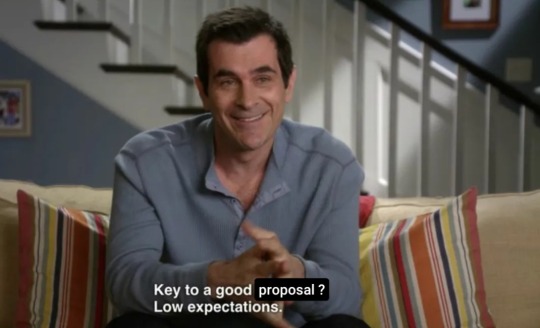
#nymphpens#dark academia#poets on tumblr#dead poets society#relatable#tumblr text post#classic literature#jane austen#lit memes#classic literature memes#pride and prejudice#pride and prejudice memes#elizabeth bennett#mr darcy#mr collins#excellent boiled potatoes#memes#literature memes#modern family x classic literature#modern family#modern family memes#modern family x pride and prejudice#lit meme#classic lit memes#humour
22 notes
·
View notes
Text
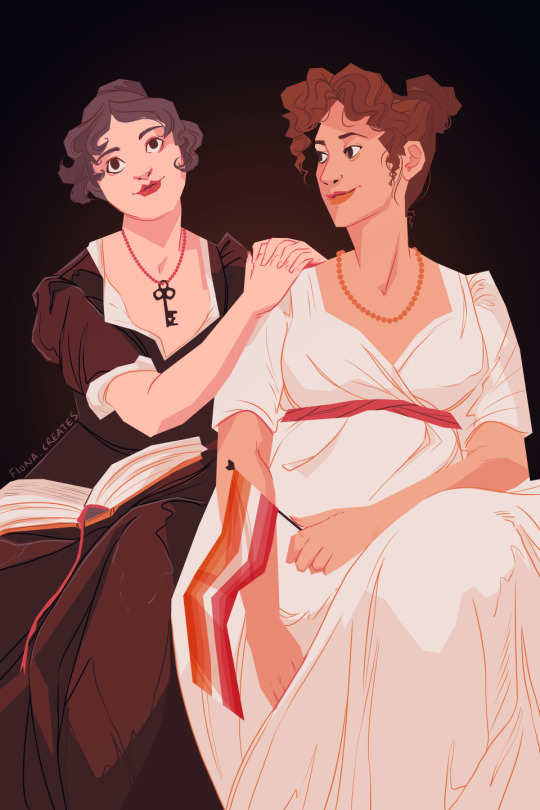
Catherine Morland and Eleanor Tilney — Northanger Abbey - definitely girlfriends. 🏳️🌈❤️💖💜🏳️🌈
Catherine is a daydreaming disaster gay ofc. Eleanor must always be saving her from herself.
(In which I continue to read into old novels with modern queer eyes.)
Referenced portrait of Charlotte and Sarah Carteret-Hardy by Thomas Lawrence
#jane austen#northanger abbey#lesbian#catherine morland#illustration#art#eleanor tilney#pride#in which i read into old books with a modern eye
613 notes
·
View notes
Text
A Full Defense of Lydia Bennet
Lydia Bennet is not a villain, but she gets a lot of hate for carelessly running off with Wickham and possibly ruining her sister’s lives. The narrator and characters, however, do not blame Lydia very much and I don’t think the author meant for us to hate her. She was failed by her parents, who did not teach her how to properly behave and did not ensure she was properly protected.
Obviously, the real villain is Wickham.
The most vicious takedown of Lydia is put in the mouth (letter) of a character we should not respect, Mr. Collins. We already know that his morality is skewed, as he seems to view the collection of tithes and sucking up to Lady Catherine as his primary duties, he writes this of Lydia, “I am inclined to think that her own disposition must be naturally bad, or she could not be guilty of such an enormity, at so early an age.” (Ch 48). However, even he mentions the real cause, “a faulty degree of indulgence”.
Elizabeth feels this cause strongly, and lays out a good argument for her father on why Lydia should not go to Brighton, “She represented to him all the improprieties of Lydia’s general behaviour, the little advantage she could derive from the friendship of such a woman as Mrs. Forster, and the probability of her being yet more imprudent with such a companion at Brighton, where the temptations must be greater than at home.” (Ch 41). Mr. Bennet dismisses all these great arguments because he is too lazy to deal with Lydia’s disappointment. He’s been a lazy parent and continues to be.
Mr. Bennet then takes on the responsibility for what happened, ““Who should suffer but myself? It has been my own doing, and I ought to feel it… No, Lizzy, let me once in my life feel how much I have been to blame.” (Ch 50). Lydia has been allowed to run around flirting with officers for months, without any check on her conduct. She does not act within the rules of society, and while Elizabeth and Jane have tried to correct her, Lydia knew they had no real authority. She needed parents and neither of them did their duty.
Mr. Bennet also acknowledges that he failed his daughters by not saving money for their future provision, “Had he done his duty in that respect” (Ch 50).
Mrs. Bennet shares this guilt, little as she will accept it: Mrs. Bennet, to whose apartment they all repaired, after a few minutes’ conversation together, received them exactly as might be expected; with tears and lamentations of regret, invectives against the villainous conduct of Wickham, and complaints of her own sufferings and ill-usage; blaming everybody but the person to whose ill-judging indulgence the errors of her daughter must principally be owing. (Ch 47)
Lastly, Lydia was failed by Darcy, who talks about his share of the blame here: “Wickham’s worthlessness had not been so well known as to make it impossible for any young woman of character to love or confide in him. He generously imputed the whole to his mistaken pride, and confessed that he had before thought it beneath him to lay his private actions open to the world.” (Ch 52). We see in Sense & Sensibility Elinor asking everyone who knows him about Willoughby’s character. Character references were important, that is how women knew they were safe in a man’s presence. Darcy knew the truth and he left Meryton and the Bennets in danger.
Lydia did make a choice (and certainly the wrong one), but she does not deserve all the blame for what happened. The narrator makes it clear that no one should be surprised by the outcome. Lydia was not taught was what right, she was not taught to control her impulses, and she was put out in the world too young, as Colonel Brandon said in Sense & Sensibility, “But can we wonder that… without a friend to advise or restrain her… she should fall?”
Related posts: Lydia too young to be out, Should Darcy have warned Meryton?
#lydia bennet#misunderstood villains#though she's not even a villain but people call her one#pride and prejudice#wickham#it is not modern of me to say Lydia is not to blame#It might have been modern of Jane Austen#But it's right there in the book she wrote#though Lydia has free will and she made choices#but she is 15 years old and Wickham was an adult
169 notes
·
View notes
Text
If Jane Austen could write about my family from the outside and I could read it then maybe I would be healed.
#moving out has helped! but is there is not a new social life/core for me yet#maybe ever? idk#but within the actual family unit there is ….. so much going on#so much suffering. so much change. unbelievable levels of stress and anxiety and depression#like I really cannot emphasize enOUGH how much#and my parents are essentially full time caregivers#and I both want to help and be a stabilizing factor and I also want to be honest about how much of a toll it takes on me#because i think it’s A Lot#but also I don’t like modern rhetoric on any of these difficult topics and I reject it even though I use a lot of the language#hence why I need Jane Austen to do it for me#to bring this full circle#anyways if you could say a prayer for us. for my parents especially but also my sister#well all the sisters and my brothers!#anyway reflecting angsting etc.#tbh I would love to know the medium of the average family’s unhappiness and stress#Because I think ours is off the charts#But idk. Would love to know more tbh#I would love to know if a lot of it just the human condition! But sometimes I’m just like this is not normal lol#thanks for listening
20 notes
·
View notes
Text
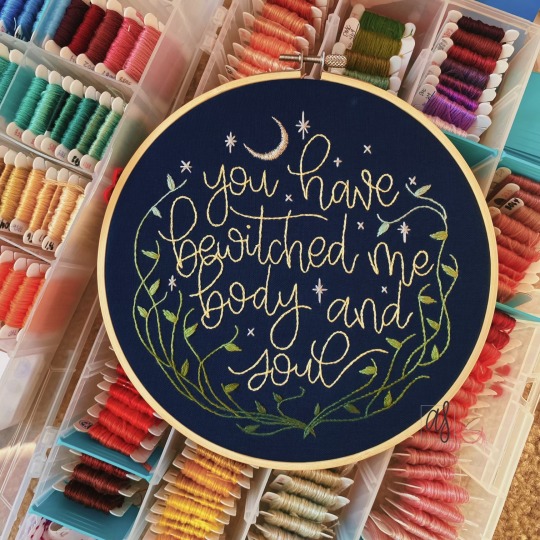
Bewitched Me PDF Pattern now available
#pride and prejudice quotes#pride and prejudice 1995#pride and prejudice#pride and predjudice 2005#Jane Austen#literature#literary quotes#embroidery art#embroidery#modern embroidery#hobby#diy craft#elizabeth x darcy#mr darcy
17 notes
·
View notes
Text
got advertised a book that's described as "a modern retelling of when harry met sally" and I just feel like there should be at least a 50 year gap between the source material and the retelling
#modern retelling of an austen book or a fairytale or something? cool great go ahead#but i feel that retelling whms except this time they have iphones instead of corded landlines isn't really that necessary#from what i can tell the modernisation is that the roles have been gender swapped and also one of them is bisexual#which is like. cool but also could they not have just taken those character ideas and given them a whole new story that isn't already a film#talking
22 notes
·
View notes